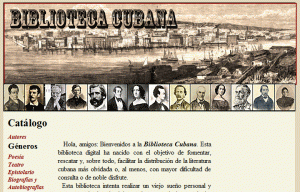 The young emigrant Sergio de los Reyes (b. Havana 1978), is based in Toronto, Canada, where he alternates his work and his passion for literature, has just launched an SOS to his countrymen on the island and exile who have Internet access, to ask them help on his personal project for a digital Library specializing in Cuban literature.
The young emigrant Sergio de los Reyes (b. Havana 1978), is based in Toronto, Canada, where he alternates his work and his passion for literature, has just launched an SOS to his countrymen on the island and exile who have Internet access, to ask them help on his personal project for a digital Library specializing in Cuban literature.
He points out that “The goal is that we all collaborate in one way or another and manage to create a fairly decent library where we can access our literature without charge. All the books are in the public domain … ”
To that end, he sent us a link http://bibliotecacubana.net) and 8 pages with authors and books available, in hopes of proposals and comments, without which it will not be possible to meet his personal, comprehensive, interesting and even necessary commitment, to delve into one of the most authentic and fascinating demonstrations of national imaginary.
In the pages sent by Sergio de los Reyes, we see that the new Digital Library Poetry includes (9 authors and 16 works), Theater (3 and 6), letters (4 and 7), biographies and autobiographies (3 and 5), fiction (8 and 19), Philosophy (4 and 15), essayist and journalist (8 and 15), Sociology (3 and 9) History (9 and 17), Natural Sciences (1 and 8), stories and customs (3 and 4) Bibliography (2 and 6), Dictionaries (1 and 2), Geography (1 and 3) literary magazines (only El Almendares, the executed poet Juan Clemente Zenea y Estrada).
In just a few months the young bibliophile’s effort is considerable, more than 60 authors and 113 digitized works is like a drop in the ocean of literature from Cuba, where after the music literature shines, but it is a good start. Maybe with perseverance and collaboration he will achieve his purpose.
The subject areas show that Sergio knows his stuff, but beyond the breadth of themes and times, the complexity of the search inside and outside the island, and the difficulty of accessing funds and institutional publishers, requires coordination work to occur in Havana, Mexico, Miami, Madrid, New York, London, Paris and other cities that hosted authors who created in exile, such as José María Heredia, Gertrudis Gómez de Avellaneda, José Martí and the many writers of the diaspora (second half of the 20th Century to the present), including Gaston Baquero, Cabrera Infante, Severo Sarduy, Reinaldo Arenas, Jose Triana, Lichi Diego, Raúl Rivero and dozens more.
I suggest patience and contacts, search by genres and stages, merging fiction with stories and customs (Narrative), separate essays and journalism, exclude history, natural sciences and other disciplines of printed media, that are far from the literary expressions. The story would force him to crawl almost infinitely to obtain and digitize the books of James Pezuela, Ramón de la Sagra, Miró and Argenter, Ramiro Guerra, Moreno Fraginals or Levi Marrero, plus testimonials from our newspapers and military strife (Figueredo, Céspedes, Maximo Gomez, Torriente Brau, Carlos Franqui, or Huber Matos).
I suppose that Sergio, a voracious reader, is disposed to reference works such as the Dictionary of Cuban Literature (two volumes) and the recent history of Cuban Literature (3 volumes), both the Institute of Literature and Linguistics, and the main catalogs, bio-bibliographies of major authors and indexes of journals, publishers and institutions in Cuba and Cubans outside the island, between these books published by the generation of Mariel and by the Center for Cuban-American Studies from Florida International University. The contact is essential because these entities digitize their bibliographic heritage, especially the publishers.
The effort to post on the Internet, regardless of state or institutions, a Cuban Literature Library, increases its value by its citizens connotation and the rescue of so many diverse and dispersed spiritual values. The proposals help to shake the dead leaves, discern, compare and display one of the areas of greatest creativity of the children of the largest island in the Caribbean.
May 4 2011
